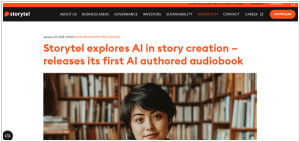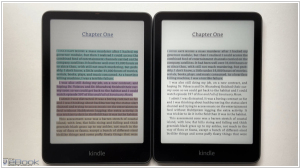Kindle Unlimited vs Storytel
July 06, 2025 | Author: Maria Lin
18
eBook subscription platform that offers access to the largest collection of eBooks for a reasonable price. Books can be read on any Kindle E-reader as well as other Amazon devices like the Fire tablet. Members can also read Kindle Unlimited titles via the free Kindle app on a computer, tablet, or smartphone, however not on other e-Readers. The platform regularly adds new books from popular and bestselling authors to the catalog.
15
Explore over 1 million audiobooks and e-books. Listen and read without limits for €9.99/month. Cancel anytime.
Kindle Unlimited vs Storytel in our news:
2025. Storytel published first audiobook written by AI

It was only a matter of time before someone handed the keys to literature over to an AI and then acted surprised when it promptly drove straight into a narrative ditch. With Audible already cozying up to artificial narrators, Storytel decided to join the fray, birthing Rosy Lett—an AI author with a suspiciously long 22-year career and an equally suspicious grasp of storytelling. Tasked with writing a novel on love in the age of AI, Rosy enthusiastically churned out what the team later described as a "generic science fiction soap opera"—which is a polite way of saying it was a plot-hole-ridden mess that made even the most convoluted telenovelas look like meticulously crafted epics. A long and exhausting process of literary life coaching ensued, at the end of which Rosy was gently encouraged to rewrite the whole thing in a much, much shorter format—perhaps in the hope that fewer words meant fewer disasters.
2015. Kindle Unlimited will pay authors get paid based on the number of pages consumer reads

Amazon announced plans to significantly alter the way it compensates authors enrolled in its Kindle Unlimited program, the Netflix-like service that allows readers to pay a flat fee ($10) to borrow an unlimited number of books each month. Starting July 1, authors will be compensated based on the number of pages read by consumers. Previously, Amazon paid authors based on whether a reader had reached the 10% mark in a book, regardless of its length. After this was calculated, a general revenue pool was distributed among authors. However, some independent authors figured out how to exploit the system by publishing a larger number of shorter books, thus earning the same, or sometimes more, revenue than those with fewer, but longer, titles.




